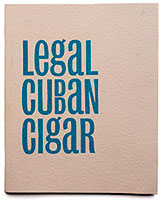 Legal Cuban Cigar By Clifton Meador Boone, North Carolina: Clifton Meador, 2016. Edition of 30. 8" x 10"; 56 pages plus a 16-page section bound into paper cover flaps. Printed on a Kodak Nexpress at Appalachian State University. Letterpress cover printed from letters cut on a CNC mill. Numbered. Signed by the artist. Clifton Meador: "The American government has had a fraught relationship with Cuba since the Cuban revolution of 1959. Received imagination portrays Havana as a mobster's playground before the revolution — a glittering city of nightclubs and casinos — but after the revolution? We mostly imagine a country of impoverished farmers, a nation with an excellent national health care system, a place of high literacy, a former client state of the Soviet Union, and home to the finest cigars in the entire world. "The American relationship with Cuba turned sour when Castro finally revealed that Cuba was, in fact, a Marxist, socialist country aligned with the Soviet Union. The failure of the Bay of Pigs invasion attempt, President Kennedy's embargo, and the subsequent Cuban missile crisis were media events played out on television and in newspapers, perhaps the first media-driven international crisis. This mediated spectacle created a 50-year estrangement between Cuba and America that only began to thaw with President Obama's efforts. "I traveled in Cuba in the fall of 2015, right after the renewal of diplomatic relations between the US and Cuba. One of the places I visited was the tobacco-growing region around Viñales. I thought about the irony in the stereotypical fetishization of Cuban cigars by businessmen, a fascination with cigars grown and produced in an impoverished communist country. "The media circus surrounding the Cuban Missile Crisis; a horseback ride to a tobacco barn; my first Cuban Cigar." |